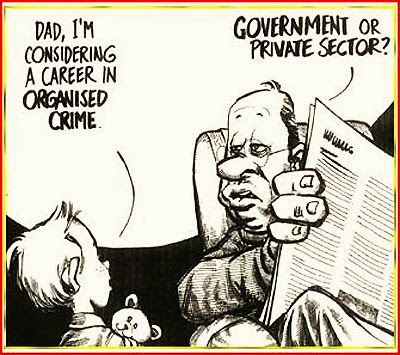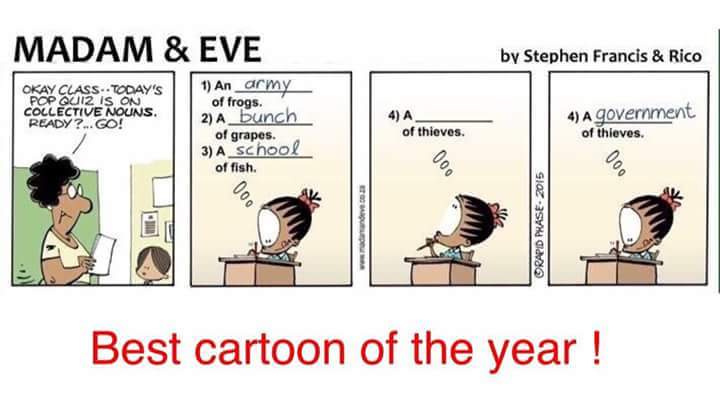When I read this article in The Star, I thought to myself, did he write it with our nation's predicament in mind? Probably not, but to me, I find it useful to relate it as a solution to our present leadership problems.
The making of effective leaders
Friday January 30, 2009
PSYCHOLOGY AT WORK
By DR GOH CHEE LEONG
IN many organisations, there is a leadership crisis of confidence. In these organisations workers don’t respect their leaders.
They don’t listen to their leaders. Most importantly, they don’t trust them.
This results in an “us versus management” mentality that makes any meaningful attempt to build a cohesive team nearly-impossible.
The team fails to perform. There is no concerted, coordinated effort to meet goals. There is a sense that the organisation is without direction and impetus.
In spite of numerous efforts to build a momentum, change does not come about because these initiatives fail to gain traction among the employees.
And no amount of “team-building” sessions, or “motivational pep talks” will bring about this desired change unless there is a fundamental change in the quality and culture of leadership.
So, what are the traits of an effective leader who commands trust from the team? Bookshops and Internet sites are lined with thousands of books on the subject. I offer the following ideas based on my personal observations:
· Competence: Good leaders know what they’re talking about. They know their job, they know their business and they know their environment. They know their organisation from bottom up.
Whenever they speak, or make a decision, their words reflect a deep understanding of the issue at hand.
Their comments are never superficial or superfluous. That is why their staff take them seriously. They may not be omniscient by any account, but they are seen as people with the intellectual curiosity and work ethic that drive them to know their job as well as they can.
This is the issue of credibility. Staff will take orders willingly, gladly even, from someone who knows his stuff.
Better still, they have a track record of success. They have demonstrated in the past that they get things done and they have the results to prove it.
Employees will not follow someone who has not earned the right to lead. The psychological reality behind most human beings is that we want to play for a winning team. When someone like Sir Alex Ferguson gives an order, the players follow, because they know that he is a manager who knows how to win. He has done it before and therefore speaks with authority.
· Fairness: Good leaders are just leaders. They don’t play favourites. They reward based on actual performance.
Under their leadership, staff know exactly where they stand.
Workers know that if they perform well and meet their performance targets, they will be rewarded in a just and fair way; and conversely, they know if they fail, there will be repercussions. Nothing breeds dislike and disrespect like the perception that the leader is unfair. Worst still, some leaders are so removed from the daily happenings of the team that they are completely oblivious to what is actually happening. This renders obsolete their ability to manage, evaluate and reward.
· Integrity: A leader with integrity walks the talk. They lead from the front. They set themselves as models to the team.
When a task needs to be done, they step forward rather than shy away. When an important decision needs to be made, they make it, and are willing to take responsibility for the consequences rather than passing the blame to others. They never demand from their employees what they themselves cannot do. There have been times when staff at certain organisations have complained that they don’t respect their leaders because the perception is that their leaders are not working as hard as the rest of the team.
· Protection: Good leaders place the needs of their staff above their own. They hold their subordinate’s welfare first and foremost in their mind.
They realise that while productivity and performance and keys to the survival of the business, their staff’s needs must be met in order for them to perform. In the army, soldiers trust a commanding officer when that officer has demonstrated that he or she places the safety of his/her team above all things. The officer must show that decisions are made to protect the team, not to put them in unnecessary danger for personal gain or ambition.
I wonder during this time of economic uncertainty, how many leaders are willing to take pay cuts, or pay freezes in order to help save the jobs of their employees. Why should our staff trust us, or follow us to the ends of the Earth, when we have not shown a willingness to sacrifice what we have to take care of them? Most of us would follow a leader with these qualities. We would be willing to go the extra mile, stretch ourselves, push ourselves to the limit to perform for such a person.
The ability to inspire trust goes way beyond words. It is a style and quality of leadership that inspires such followers.
(Dr Goh Chee Leong is the vice-president of HELP University College and a psychologist. )
How should we judge a government?
In Malaysia, if you don't watch television or read newspapers, you are uninformed; but if you do, you are misinformed!
"If you're not careful, the newspapers will have you hating the people who are being oppressed, and loving the people who are doing the oppressing." - Malcolm X
Never argue with stupid people, they will drag you down to their level and then beat you with experience - Mark Twain
Why we should be against censorship in a court of law: Publicity is the very soul of justice … it keeps the judge himself, while trying, under trial. - Jeremy Bentham
"Our government is like a baby's alimentary canal, with a happy appetite at one end and no
responsibility at the other. " - Ronald Reagan
Government fed by the people

Career options

I suggest government... because nobody has ever been caught.
Corruption so prevalent it affects English language?

Corruption is so prevalent it affects English language?
When there's too much dirt...

We need better tools... to cover up mega corruptions.
Prevent bullying now!

If you're not going to speak up, how is the world supposed to know you exist? “Orang boleh pandai setinggi langit, tapi selama ia tidak menulis, ia akan hilang di dalam masyarakat dan dari sejarah.” - Ananta Prameodya Toer (Your intellect may soar to the sky but if you do not write, you will be lost from society and to history.)
Subscribe to:
Post Comments (Atom)
No comments:
Post a Comment